- Home
- Emile Gaboriau
Monsieur Lecoq, v. 1 Page 11
Monsieur Lecoq, v. 1 Read online
Page 11
XI
The governor of the Depot, a functionary who had gained the reputationof an oracle by twenty years' experience in prisons and withprisoners--a man whom it was most difficult to deceive--had advised themagistrate to surround himself with every precaution before examiningthe prisoner, May.
And yet this man, characterized as a most dangerous criminal, and thevery announcement of whose coming had made the clerk turn pale, hadproved to be a practical, harmless, and jovial philosopher, vain of hiseloquence, a bohemian whose existence depended upon his ability to turna compliment; in short, a somewhat erratic genius.
This was certainly strange, but the seeming contradiction did not causeM. Segmuller to abandon the theory propounded by Lecoq. On the contrary,he was more than ever convinced of its truth. If he remained silent,with his elbows leaning on the desk, and his hands clasped over hiseyes, it was only that he might gain time for reflection.
The prisoner's attitude and manner were remarkable. When his Englishharangue was finished, he remained standing in the centre of the room, ahalf-pleased, half-anxious expression on his face. Still, he was as muchat ease as if he had been on the platform outside some stroller's booth,where, if one could believe his story, he had passed the greater part ofhis life. It was in vain that the magistrate sought for some indicationof weakness on his features, which in their mobility were moreenigmatical than the lineaments of the Sphinx.
Thus far, M. Segmuller had been worsted in the encounter. It is true,however, that he had not as yet ventured on any direct attack, nor hadhe made use of any of the weapons which Lecoq had forged for his use.Still he was none the less annoyed at his defeat, as it was easy to seeby the sharp manner in which he raised his head after a few moments'silence. "I see that you speak three European languages correctly," saidhe. "It is a rare talent."
The prisoner bowed, and smiled complacently. "Still that does notestablish your identity," continued the magistrate. "Have you anyacquaintances in Paris? Can you indicate any respectable person who willvouch for the truth of this story?"
"Ah! sir, it is seventeen years since I left France."
"That is unfortunate, but the prosecution can not content itself withsuch an explanation. What about your last employer, M. Simpson? Who ishe?"
"M. Simpson is a rich man," replied the prisoner, rather coldly, "worthmore than two hundred thousand francs, and honest besides. In Germany hetraveled with a show of marionettes, and in England with a collection ofphenomena to suit the tastes of that country."
"Very well! Then this millionaire could testify in your favor; it wouldbe easy to find him, I suppose?"
"Certainly," responded May, emphatically. "M. Simpson would willinglydo me this favor. It would not be difficult for me to find him, only itwould require considerable time."
"Why?"
"Because at the present moment he must be on his way to America. It wason account of this journey that I left his company--I detest the ocean."
A moment previously Lecoq's anxiety had been so intense that hisheart almost stopped beating; on hearing these last words, however,he regained all his self-possession. As for the magistrate, he merelygreeted the murderer's reply with a brief but significant ejaculation.
"When I say that he is on his way," resumed the prisoner, "I may bemistaken. He may not have started yet, though he had certainly made allhis arrangements before we separated."
"What ship was he to sail by?"
"He did not tell me."
"Where was he when you left him?"
"At Leipsic."
"When was this?"
"Last Wednesday."
M. Segmuller shrugged his shoulders disdainfully. "So you say you werein Leipsic on Wednesday? How long have you been in Paris?"
"Since Sunday afternoon, at four o'clock."
"It will be necessary to prove that."
Judging by the murderer's contracted brow it might be conjecturedthat he was making a strenuous effort to remember something. He castquestioning glances first toward the ceiling and then toward the floor,scratching his head and tapping his foot in evident perplexity. "How canI prove it--how?" he murmured.
The magistrate did not appear disposed to wait. "Let me assist you,"said he. "The people at the inn where you boarded while in Leipsic mustremember you."
"We did not stop at an inn."
"Where did you eat and sleep, then?"
"In M. Simpson's large traveling-carriage; it had been sold, but he wasnot to give it up until he reached the port he was to sail from."
"What port was that?"
"I don't know."
At this reply Lecoq, who had less experience than the magistrate in theart of concealing one's impressions, could not help rubbing his handswith satisfaction. The prisoner was plainly convicted of falsehood,indeed driven into a corner.
"So you have only your own word to offer in support of this story?"inquired M. Segmuller.
"Wait a moment," said the prisoner, extending his arm as if to clutch ata still vague inspiration--"wait a moment. When I arrived in Paris I hadwith me a trunk containing my clothes. The linen is all marked with thefirst letter of my name, and besides some ordinary coats and trousers,there were a couple of costumes I used to wear when I appeared inpublic."
"Well, what have you done with all these things?"
"When I arrived in Paris, I took the trunk to a hotel, close by theNorthern Railway Station--"
"Go on. Tell us the name of this hotel," said M. Segmuller, perceivingthat the prisoner had stopped short, evidently embarrassed.
"That's just what I'm trying to recollect. I've forgotten it. But Ihaven't forgotten the house. I fancy I can see it now; and, if some onewould only take me to the neighborhood, I should certainly recognizeit. The people at the hotel would know me, and, besides, my trunk wouldprove the truth of what I've told you."
On hearing this statement, Lecoq mentally resolved to make a tour ofinvestigation through the various hotels surrounding the Gare du Nord.
"Very well," retorted the magistrate. "Perhaps we will do as yourequest. Now, there are two questions I desire to ask. If you arrivedin Paris at four o'clock in the afternoon, how did it happen that bymidnight of the same day you had discovered the Poivriere, which ismerely frequented by suspicious characters, and is situated in such alonely spot that it would be impossible to find it at night-time, if onewere not familiar with the surrounding localities? In the second place,how does it happen, if you possess such clothing as you describe, thatyou are so poorly dressed?"
The prisoner smiled at these questions. "I can easily explain that," hereplied. "One's clothes are soon spoiled when one travels third-class,so on leaving Leipsic I put on the worst things I had. When I arrivedhere, and felt my feet on the pavements of Paris, I went literally wildwith delight. I acted like a fool. I had some money in my pocket--it wasShrove Sunday--and my only thought was to make a night of it. I did notthink of changing my clothes. As I had formerly been in the habit ofamusing myself round about the Barriere d'Italie, I hastened there andentered a wine-shop. While I was eating a morsel, two men came in andbegan talking about spending the night at a ball at the Rainbow. Iasked them to take me with them; they agreed, I paid their bills, andwe started. But soon after our arrival there these young men left meand joined the dancers. It was not long before I grew weary of merelylooking on. Rather disappointed, I left the inn, and being foolishenough not to ask my way, I wandered on till I lost myself, whiletraversing a tract of unoccupied land. I was about to go back, when Isaw a light in the distance. I walked straight toward it, and reachedthat cursed hovel."
"What happened then?"
"Oh! I went in; called for some one. A woman came downstairs, and Iasked her for a glass of brandy. When she brought it, I sat down andlighted a cigar. Then I looked about me. The interior was almost enoughto frighten one. Three men and two women were drinking and chatting inlow tones at another table. My face did not seem to suit them. One ofthem got up, came toward me, and said: 'You are
a police agent; you'vecome here to play the spy; that's very plain.' I answered that I wasn'ta police agent. He replied that I was. I again declared that I wasn't.In short, he swore that he was sure of it, and that my beard was false.So saying, he caught hold of my beard and pulled it. This made me mad. Ijumped up, and with a blow of my fist I felled him to the ground. Inan instant all the others were upon me! I had my revolver--you know therest."
"And while all this was going on what were the two women doing?"
"Ah! I was too busy to pay any attention to them. They disappeared!"
"But you saw them when you entered the place--what were they like?"
"Oh! they were big, ugly creatures, as tall as grenadiers, and as darkas moles!"
Between plausible falsehood, and improbable truth, justice--humanjustice, and therefore liable to error--is compelled to decide as bestit can. For the past hour M. Segmuller had not been free from mentaldisquietude. But all his doubts vanished when he heard the prisonerdeclare that the two women were tall and dark. If he had said: "Thewomen were fair," M. Segmuller would not have known what to believe, butin the magistrate's opinion the audacious falsehood he had just heardproved that there was a perfect understanding between the supposedmurderer and Widow Chupin.
Certainly, M. Segmuller's satisfaction was great; but his face did notbetray it. It was of the utmost importance that the prisoner shouldbelieve that he had succeeded in deceiving his examiner. "You mustunderstand how necessary it is to find these women," said the magistratekindly.
"If their testimony corresponds with your allegations, your innocencewill be proved conclusively."
"Yes, I understand that; but how can I put my hand upon them?"
"The police can assist you--our agents are always at the serviceof prisoners who desire to make use of them in establishing theirinnocence. Did you make any observations which might aid in thediscovery of these women?"
Lecoq, whose eyes never wandered from the prisoner's face, fancied thathe saw the faint shadow of a smile on the man's lips.
"I remarked nothing," said the prisoner coldly.
M. Segmuller had opened the drawer of his desk a moment before. Henow drew from it the earring which had been found on the scene of thetragedy, and handing it abruptly to the prisoner, he asked: "So youdidn't notice this in the ear of one of the women?"
The prisoner's imperturbable coolness of demeanor did not forsake him.He took the jewel in his hand, examined it attentively, held it up tothe light, admired its brilliant scintillations, and said: "It is a veryhandsome stone, but I didn't notice it."
"This stone," remarked the magistrate, "is a diamond."
"Ah!"
"Yes; and worth several thousand francs."
"So much as that!"
This exclamation may have been in accordance with the spirit of the partassumed by the prisoner; though, at the same time, its simplicitywas undoubtedly far-fetched. It was strange that a nomad, such as themurderer pretended to have been, acquainted with most of the countriesand capitals of Europe, should have displayed this astonishment onlearning the value of a diamond. Still, M. Segmuller did not seem tonotice the discrepancy.
"Another thing," said he. "When you threw down your pistol, crying,'Come and take me,' what did you intend to do?"
"I intended to make my escape."
"In what way?"
"Why, of course, by the door, sir--by--"
"Yes, by the back door," retorted the magistrate, with freezing irony."It remains for you to explain how you--you who had just entered thathovel for the first time--could have known of this door's existence."
For once, in the course of the examination, the prisoner seemedtroubled. For an instant all his assurance forsook him. He evidentlyperceived the danger of his position, and after a considerable effort hecontrived to burst out in a laugh. His laugh was a poor one, however; itrang false, and failed to conceal a sensation of deep anxiety. Growinggradually bolder, he at length exclaimed: "That's nonsense, I had justseen these two women go out by that very door."
"Excuse me, you declared a minute ago that you did not see these womenleave: that you were too busy to watch their movements."
"Did I say that?"
"Word for word; the passage shall be shown you. Goguet, find it."
The clerk at once read the passage referred to, whereupon the prisonerundertook to show that the remark had been misunderstood. He hadnot said--at least, he did not intend to say--that; they had quitemisinterpreted his words. With such remarks did he try to palliate theeffect of his apparent blunders.
In the mean while, Lecoq was jubilant. "Ah, my fine fellow," thought he,"you are contradicting yourself--you are in deep water already--you arelost. There's no hope for you."
The prisoner's situation was indeed not unlike that of a bather, who,unable to swim, imprudently advances into the sea until the water risesabove his chin. He may for a while have preserved his equilibrium,despite the buffeting of the waves, but now he totters, loses hisfooting--another second, and he will sink!
"Enough--enough!" said the magistrate, cutting the prisoner'sembarrassed explanation short. "Now, if you started out merely withthe intention of amusing yourself, how did it happen that you took yourrevolver with you?"
"I had it with me while I was traveling, and did not think of leaving itat the hotel any more than I thought of changing my clothes."
"Where did you purchase it?"
"It was given me by M. Simpson as a souvenir."
"Confess that this M. Simpson is a very convenient personage," said themagistrate coldly. "Still, go on with your story. Only two chambers ofthis murderous weapon were discharged, but three men were killed. Youhave not told me the end of the affair."
"What's the use?" exclaimed the prisoner, in saddened tones. "Two of myassailants had fallen; the struggle became an equal one. I seized theremaining man, the soldier, round the body, and threw him down. He fellagainst a corner of the table, and did not rise again."
M. Segmuller had unfolded upon his desk the plan of the Poivriere drawnby Lecoq. "Come here," he said, addressing the prisoner, "and show me onthis paper the precise spot you and your adversaries occupied."
May obeyed, and with an assurance of manner a little surprising in a manin his position, he proceeded to explain the drama. "I entered," saidhe, "by this door, marked C; I seated myself at the table, H, to theleft of the entrance: my assailants occupied the table between thefireplace, F, and the window, B."
"I must admit," said the magistrate, "that your assertions fully agreewith the statements of the physicians, who say that one of the shotsmust have been fired about a yard off, and the other about two yardsoff."
This was a victory for the prisoner, but he only shrugged his shouldersand murmured: "That proves that the physicians knew their business."
Lecoq was delighted. This part of the prisoner's narrative not merelyagreed with the doctor's statements, but also confirmed his ownresearches. The young detective felt that, had he been the examiner,he would have conducted the investigation in precisely the same way.Accordingly, he thanked heaven that M. Segmuller had supplied the placeof M. d'Escorval.
"This admitted," resumed the magistrate, "it remains for you to explaina sentence you uttered when the agent you see here arrested you."
"What sentence?"
"You exclaimed: 'Ah, it's the Prussians who are coming; I'm lost!' Whatdid you mean by that?"
A fleeting crimson tinge suffused the prisoner's cheek. It was evidentthat if he had anticipated the other questions, and had been preparedfor them, this one, at least, was unexpected. "It's very strange," saidhe, with ill-disguised embarrassment, "that I should have said such athing!"
"Five persons heard you," insisted the magistrate.
The prisoner did not immediately reply. He was evidently trying to gaintime, ransacking in his mind for a plausible explanation. "After all,"he ultimately said, "the thing's quite possible. When I was with M.Simpson, we had with us an old soldier who had belonged to
Napoleon'sbody-guard and had fought at Waterloo. I recollect he was alwaysrepeating that phrase. I must have caught the habit from him."
This explanation, though rather slow in coming, was none the lessingenious. At least, M. Segmuller appeared to be perfectly satisfied."That's very plausible," said he; "but there is one circumstance thatpasses my comprehension. Were you freed from your assailants before thepolice entered the place? Answer me, yes or no."
"Yes."
"Then why, instead of making your escape by the back door, the existenceof which you had divined, did you remain on the threshold of the doorleading into the back room, with a table before you to serve as abarricade, and your revolver leveled at the police, as if to keep themat bay?"
The prisoner hung his head, and the magistrate had to wait for hisanswer. "I was a fool," he stammered at last. "I didn't know whetherthese men were police agents or friends of the fellows I had killed."
"In either case your own interest should have induced you to fly."
The prisoner remained silent.
"Ah, well!" resumed M. Segmuller, "let me tell you my opinion. I believeyou designedly and voluntarily exposed yourself to the danger of beingarrested in order to protect the retreat of the two women who had justleft."
"Why should I have risked my own safety for two hussies I did not evenknow?"
"Excuse me. The prosecution is strongly inclined to believe that youknow these two women very well."
"I should like to see any one prove that!" So saying, the prisonersmiled sneeringly, but at once changed countenance when the magistrateretorted in a tone of assurance: "I will prove it."

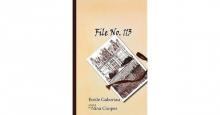 Le dossier no. 113. English
Le dossier no. 113. English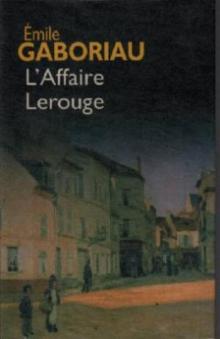 L'affaire Lerouge. English
L'affaire Lerouge. English Le crime d'Orcival. English
Le crime d'Orcival. English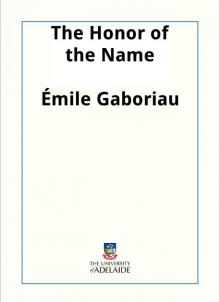 The Honor of the Name
The Honor of the Name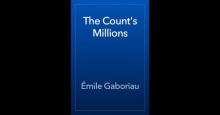 The Count's Millions
The Count's Millions Caught in the Net
Caught in the Net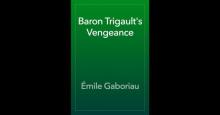 Baron Trigault's Vengeance
Baron Trigault's Vengeance La clique dorée. English
La clique dorée. English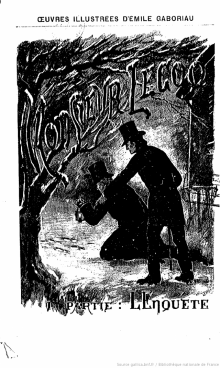 Monsieur Lecoq, v. 1
Monsieur Lecoq, v. 1 Within an Inch of His Life
Within an Inch of His Life Other People's Money
Other People's Money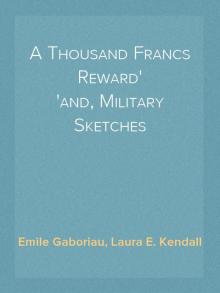 A Thousand Francs Reward; and, Military Sketches
A Thousand Francs Reward; and, Military Sketches